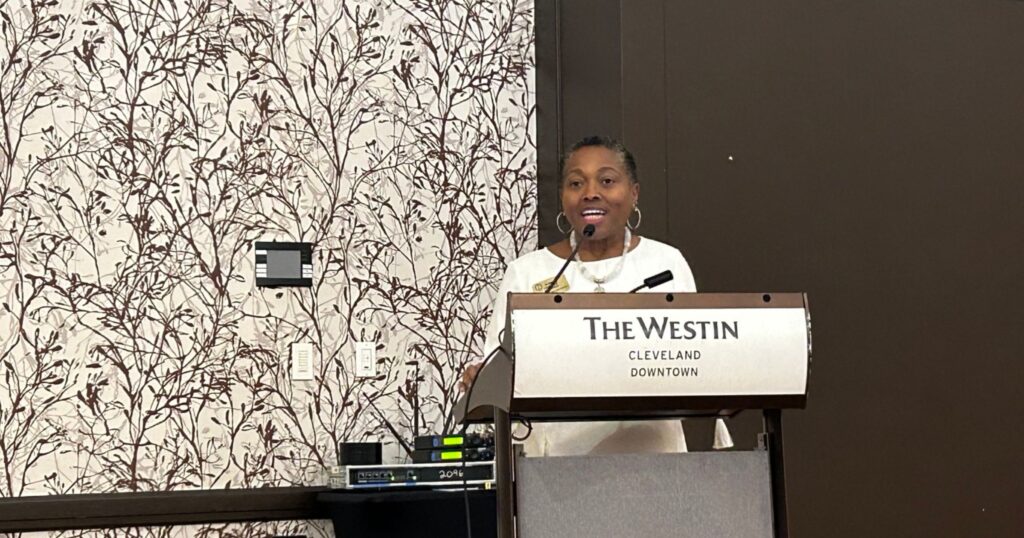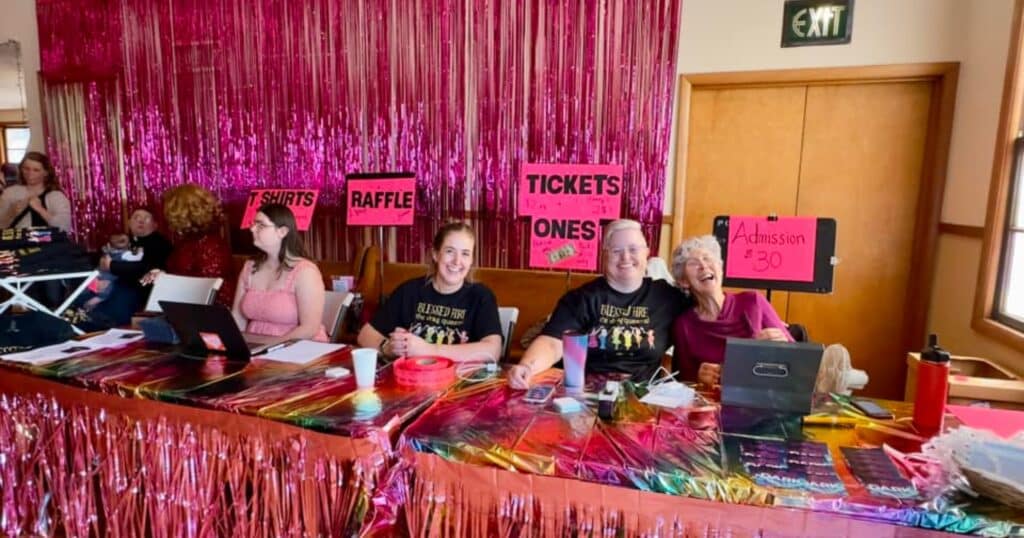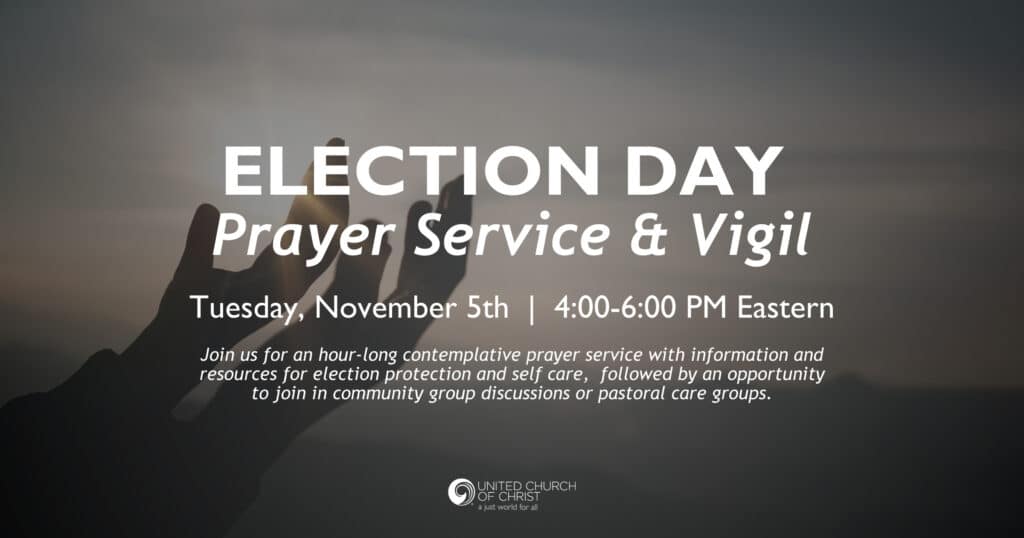Board affirms: Karen Georgia Thompson will be first woman to lead UCC if elected by Synod
The United Church of Christ is poised to make a historic choice.
After a year-long process, the UCC Board voted March 4 to nominate Associate General Minister, the Rev. Karen Georgia Thompson, for General Minister and President.
If elected by the General Synod this summer, Thompson would be the first woman — and the first woman of African descent — to lead the denomination.
“We couldn’t have more faith in Rev. Dr. Karen Georgia Thompson,” said the Rev. Cameron Barr, UCCB chair. “She has articulated our shared values on a global stage as Ecumenical Officer and Associate General Minister, and now, provided that she is elected by General Synod, she will be our spiritual leader.”
“We sought a leader who will champion the UCC’s mission and values both within the church and externally; embody an adaptive, resilient leader who can guide the UCC through rapidly changing times; and provide a foundation for the church’s future stability and growth,” said the Rev. Noah Brewer-Wallin, chair of the Search Committee that recommended Thompson. “And the Search Committee is clear that we have found such a leader in Rev. Thompson.”
Thompson’s vision for the future of the UCC embodies the values at the heart of her work: religious multiplicity and diversity, justice for marginalized communities world-wide and broader affirmation of spiritual practices beyond mainline Christianity.
“My hope is that we, the UCC, will begin to live more fully into what it means to be a church that proclaims to be God-centered and Spirit-filled,” Thompson said after the vote. “It’s not just about the head, but also about the heart. How do we become mission-minded? How do we show up? How do we be present for communities that are on the margins — not just here, but globally?”
Promoting spiritual diversity
The board affirmed Thompson with a confidential ballot vote of 39 for, seven against and three abstentions, clearing the two-thirds threshold needed.
In her remarks to the board prior to its decision, Thompson highlighted the importance of spiritual diversity in the denomination moving forward.
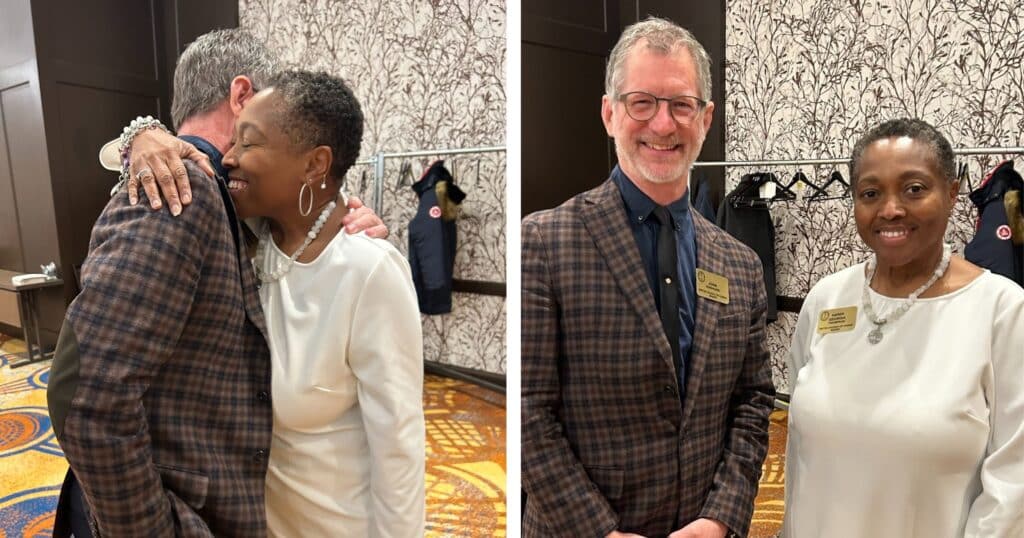
“I see the UCC as a place that will continue to welcome those who will come,” she said. “As a community, we are theologically diverse and will continue to be so. We hold the tensions of beliefs, theologies, race, gender identification and much more. Can we make room for adding depth to our understanding of who we are as a spiritual people?
“I envision the UCC widening the welcome to the table and opening wider the doors of the church.”
This focus on broadening the denomination’s understanding of inclusivity proved key to Thompson’s nomination.
Amid the decline of church membership, Brewer-Wallin pointed to the significance of Thompson’s deep understanding of religious multiplicity for the future of the church. They also highlighted Thompson’s assertion that UCC congregations already are opening their doors to embrace greater diversity of practices and traditions.
“She describes this as needing to ‘expand the table,’ making space for a fuller spectrum of people coming into the church,” Brewer-Wallin said.
‘The multiplicity of God’
Thompson believes that this expansive understanding of faith, in practices as well as beliefs, is in keeping with the UCC’s long-held values.
“I think the church — and not just the UCC, but the church universal — is in a peculiar place,” she said. “There are many challenges and, with them, many opportunities.
“I believe that I have a perspective that lends itself to where the United Church of Christ could be in the near future in terms of the UCC ethos: welcoming people, creating space for people to explore their spirituality and people who experience their spiritual lives on the fringe of what we consider to be mainstream or mainline Christianity.”
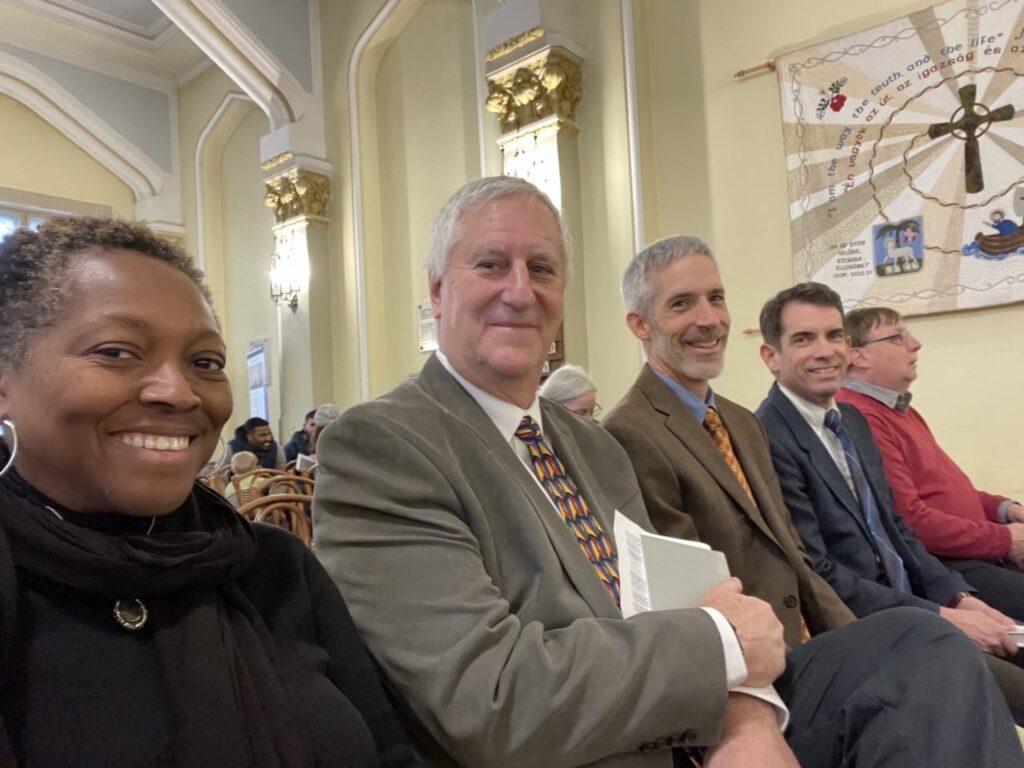
Thompson explained that, while Christianity may look “a particular way” today, its many forms are continuing to evolve, “not just in this country but in other places as well.”
As she put it to the board, “People are experiencing presence of Spirit in the multiplicity of God revealed among us.”
Thompson’s extensive experience and background with many traditions — both within the UCC and beyond it — are strong attributes for a future General Minister and President, stressed Brewer-Wallin.
“Her equal skill at both tending to relationships and honoring policy and process reflect the adaptive, resilient leader she is and will serve her well in whatever challenges will face the church in the coming years,” they said.
Justice world-wide
Thompson would bring a global, interfaith perspective to the UCC’s highest office. In her current role, she leads Wider Church Ministries and serves as Co-Executive of Global Ministries. In September, Thompson was elected to the Executive Committee of the World Council of Churches.
This comes after leadership positions in a number of national and international ecumenical organizations, such as the National Council of Churches, the Caribbean and North American Council of the World Communion of Reformed Churches and Churches Uniting in Christ.
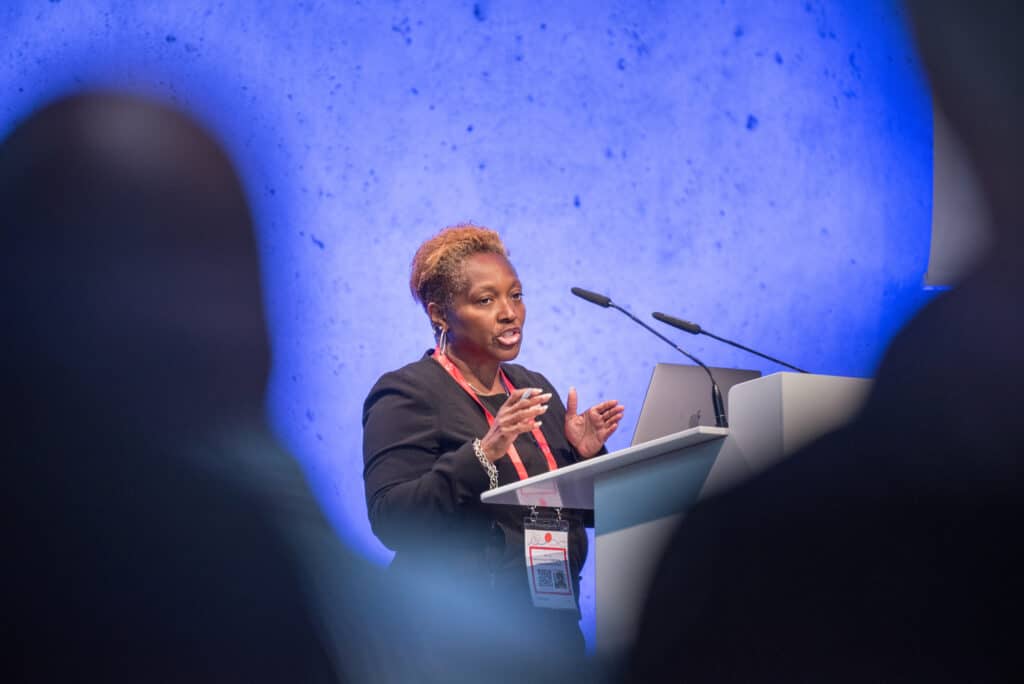
“Being church means we are locally rooted and globally focused, connecting the issues we see in ways that allow us to bring justice to the world,” Thompson said to the board.
She emphasized that dismantling oppressive systems everywhere is necessary for both communities and congregations, internationally and domestically, to thrive.
“Decolonizing the church on all levels has to be a priority,” she said. “Decolonizing the church includes our commitment to racial justice and more. Being antiracist and inclusive requires that we decolonize our institutions in ways that afford all to be present and participate equally. This is a commitment to equity for all.”
Her deep knowledge of the intersection of justice movements near and far convinced supporters of her ability to lead the diverse tapestry of the UCC.
“From Rev. Thompson’s global experience, she consistently articulates an understanding of the church as contextual with no cookie-cutter solutions,” Brewer-Wallin said. “She is grounded in care for church leaders and the communities they serve, and this drives her to think imaginatively about what it means to develop financial resources to support and advance church life.”
Ancestral roots
This passion for international, interreligious collaboration and thirst for justice, especially for people of African descent, grew out of Thompson’s roots.
Born in Kingston, Jamaica, she immigrated to New York City as a teenager, eventually graduating from Brooklyn College. She later obtained a Master of Public Administration from North Carolina Central University and a Master of Divinity from Union Theological Seminary in New York.
She received her Doctorate in Ministry from Seattle University, publishing her dissertation on the multiple religious traditions practiced by African Caribbean people.
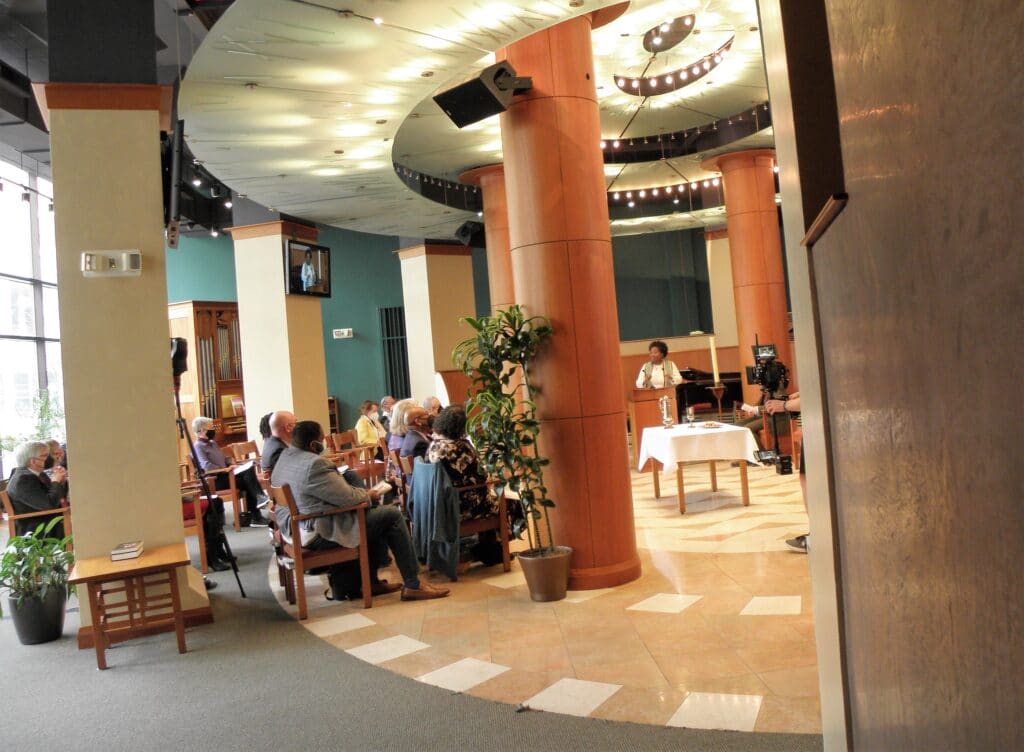
“I am the descendant of people who were brought from Nigeria, Sierra Leone, Kenya and Ghana into the Americas as enslaved people,” Thompson said to the board prior to its vote. “I stand before you today because they believed and knew we are more than we were declared by those who deemed them to be less than human. I stand before you today carrying the wisdom they bore as healers, seers, spiritualists and interpreters of dreams. I am here because my parents who did not have as much as a high school education sent me to school and believed I could be more than they could be.”
She explained that her interlocking identities as a Black woman, an African descendant, a Jamaican immigrant, a poet and a public theologian all are central to Thompson’s life, work and ministry.
‘I am a pastor’
Thompson has served in the National Setting for more than a decade. Prior to her election as AGM in 2019, she was Minister for Racial Justice, then Minister for Ecumenical and Interfaith Relations. In those positions, she helped foster “Sacred Conversations on Race,” implement the A.C.T. Now to End Racism initiative and promote racial justice and ecumenical relations on a global scale.
Before her national service, Thompson was Minister for Disaster Response and Recovery for the Florida Conference. And before that, she became the first female pastor of African descent in the Conference when she was called to the new-start, 15-member New Hope UCC in DeLand, Fla.
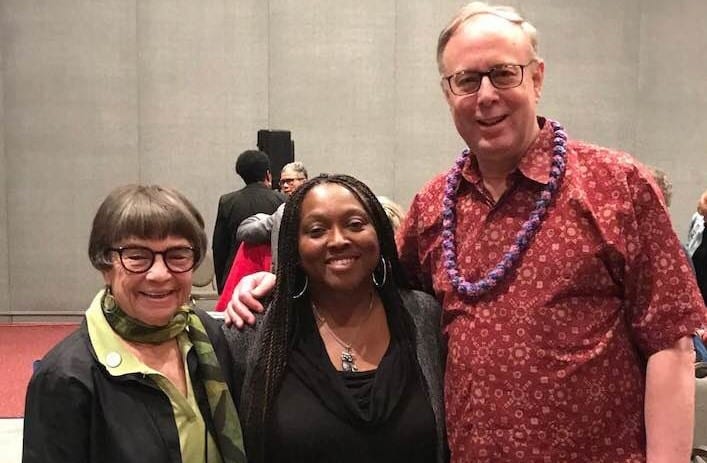
“The congregation rented space from the local synagogue,” she recalled to the board. “Those 15 people were more like three to five in weekly attendance. Every Sunday, the hymnals, the large church Bible, the large wooden cross, the sound system and the keyboard were packed into the back of my car and taken to their places in the synagogue for Sunday worship.”
That local church ministry, she explained, informs her work now as a UCC leader.
“I am a pastor,” Thompson said. “My experience of 19 years ago is not far removed from those of our pastors today. Bi-vocational realities compete with quality of life and the ability to nurture self-care and attend adequately to the needs of family. Our small churches are still struggling along with rural churches and new churches.”
Connecting all levels of the UCC — local to regional to national — will help pastors and congregations sustain and thrive, she added.
Women nominated before
While Thompson’s election as a woman and as a Black woman would be historic, the candidacy of a woman for UCC president is not unprecedented.
In 1989, the Rev. Yvonne Delk — the first African American woman ordained in the UCC — was nominated for President from the floor of General Synod, although she did not win.
“She got a significant amount of votes,” recalled Brenda Dalton James, vice chair of the GMP Search Committee and a member of the UCC Historical Council, who was present for that moment.
The Synod voted in 1999 to change the bylaws, so nominations for National Officers are no longer accepted from the floor. The same year, the Rev. Barbara Brown Zikmund was recommended for General Minister and President by a search committee, but her nomination did not ultimately make it to Synod.
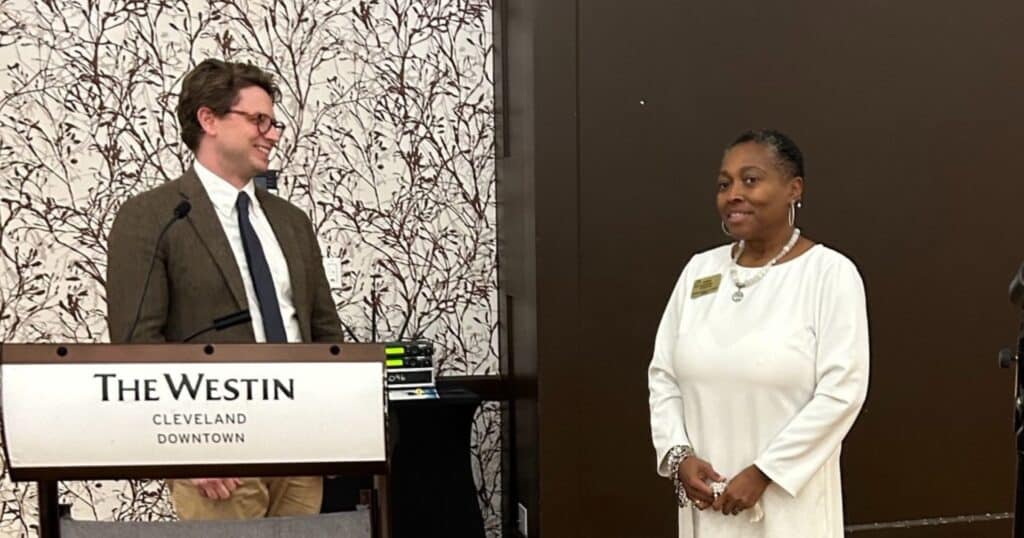
Now, Thompson is poised to become the first woman to lead the UCC, if she is affirmed by at least 60 percent of the delegates at General Synod 34, to be held June 30-July 4.
‘A significant event’
“In 2023, with everything that’s going on in the United States and around the world, it’s quite a step-back moment to remember from whence we came to get to this point,” Dalton James said.
She noted that two previous presidents of the UCC were African American: the Rev. Joe Evans — who stepped into the role following the death of the Rev. Robert Moss — and the Rev. Geoffrey Black.
But none have been a woman. Yet.
Thompson’s nomination by the board sends a message that “we stand by what we say” about inclusivity, Dalton James asserted.
A woman potentially leading the denomination “is quite powerful and quite humbling and quite a significant event in the life UCC and the faith community in general,” she said. “It’s one of those things where it’s like, you want it to happen, but you’re not sure it will. … If you had asked me 15 or 20 years ago if this could happen, I would have said, ‘No way.’”
“I feel very sure that this has been as wide ranging and thoroughgoing as any search for the General Minister and President we have ever conducted — perhaps more so than any search in the past,” Barr said. “Our search process brought us into dialogue with interested candidates from many settings inside and outside the institutional church, including qualified ministers in large congregations, Conference and judicatory ministers, chaplains, deans and seminary presidents, and ministers serving as nonprofit executives.
“In the end, our discernment has led us home to our denomination’s chief diplomat.”
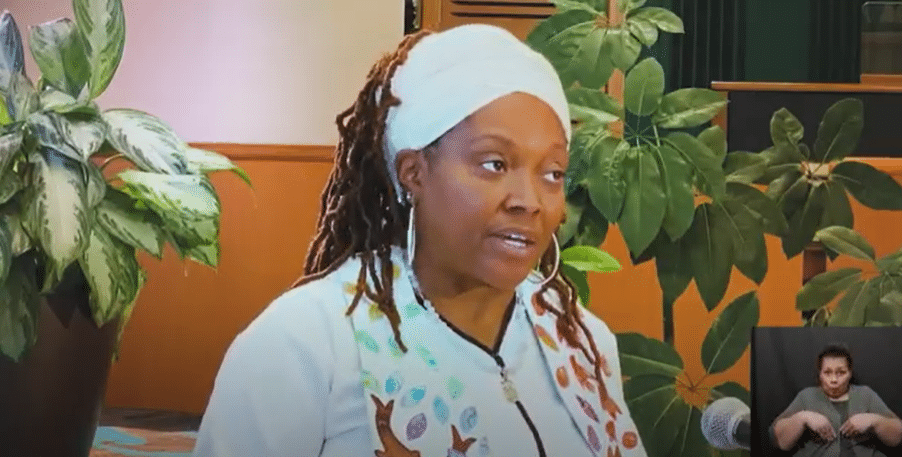
Two new Officers?
If Thompson is indeed elected, the board will need to fill her current job.
At its last meeting in the fall of 2022, the board recommended Thompson for re-election. However, with her nomination as General Minister and President, Thompson has withdrawn her candidacy as AGM of Wider Church Ministries. Presuming Synod elects her as GMP, she will serve in her post until Aug. 1.
In the months leading up to Synod, the board will work closely with her to develop guidelines to identify an acting AGM. The interim officer then will serve as Thompson’s successor until the following General Synod 35 in 2025.
With new leaders likely stepping into National Officer roles this summer, the UCC will have an opportunity to “Make All Things New,” as this year’s Synod theme proclaims. And that could lead to a bright future.
To the board, Thompson expressed a hope that the UCC would continue to be a “united and uniting” church as it moves through the 21st century and into the 22nd.
“The possibility of uniting is yet to be explored,” she said. “I would like to see the United Church of Christ continue to live into this ecumenical witness.”
Content on ucc.org is copyrighted by the National Setting of the United Church of Christ and may be only shared according to the guidelines outlined here.
Related News
‘Blessed Are the Drag Queens’: Oregon church event celebrates love and acceptance
Amid harmful anti-trans and nonbinary legislation and political messaging, Bridgeport United...
Read MoreUCC to offer Election Day Prayer Service and Vigil
On Election Day, Nov. 5, join the Rev. Karen Georgia A. Thompson together with United Church...
Read MoreGoing beyond the blessing: Churches emulate St. Francis’ care for animals
https://www.youtube.com/watch?v=lu3LYwhLxCo UCC News presents a video news story on the...
Read More